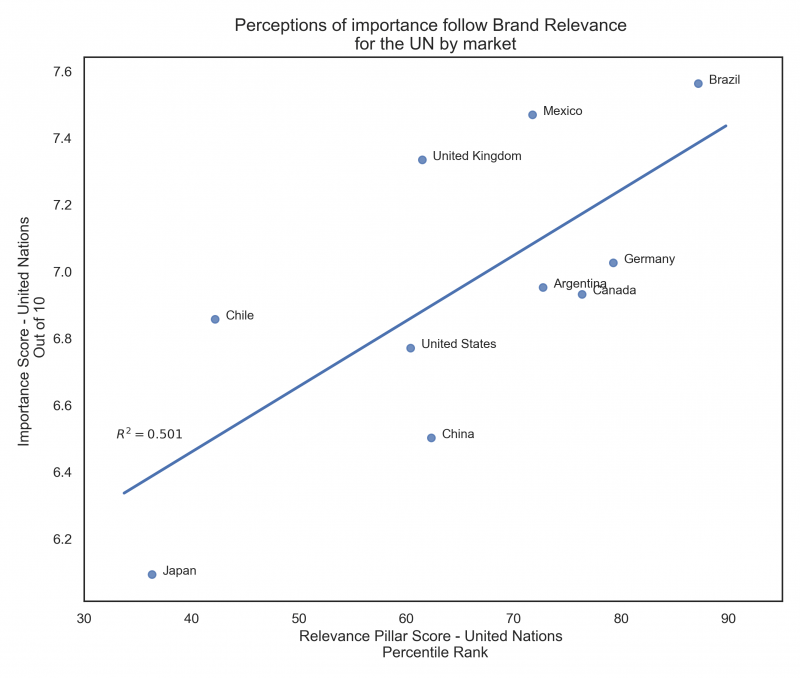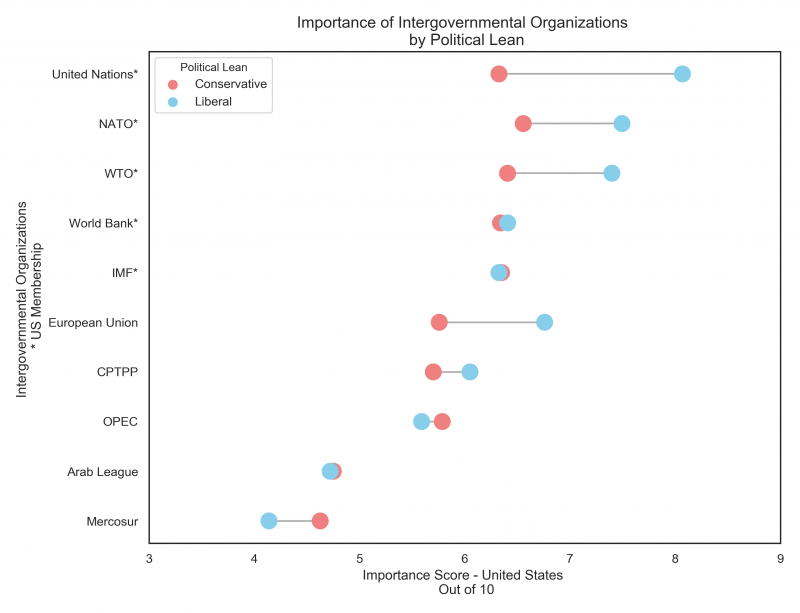Assessing the Value of Multilateral Cooperation
01.14.2020

2019 was a tumultuous year in the global arena. Globalization and the plethora of intergovernmental organizations to support it appear to be losing their defining purpose.
In 2016, the United States pulled out of multiple intergovernmental agreements and organizations, leaving the Paris Climate Accord and the U.N. Human Rights Council, all the while questioning the United States’ defense obligations towards NATO members. The United Kingdom has followed suit, doubling down on its efforts to leave the European Union without yet considering new agreements. Leaders in Italy, Poland, the Netherlands, Hungary, Austria, France and other countries have professed disillusionment with the European Union.
However, the 2020 Best Countries report suggests people around the world might not share their leaders’ skepticism toward intergovernmental organizations (IGOs). This year, 59% of global respondents believe they have benefited from their country’s membership in one of these IGOs. More than 80% want global cooperation to promote free trade around the world and fight issues such as the refugee crisis, internet standards or the climate emergency.
People express overwhelming support for cooperating within multiparty frameworks, but some of their elected leaders are actively working against multilateralism. This prompted us to dig deeper and ask our Best Countries panel: how important do people believe these organizations really are?
We asked citizens around the world how important they perceived ten of the larger IGOs to be.
Here are some of the more notable results:
|
Intergovernmental Organization |
Importance Score (Global, out of 10) |
|
United Nations |
7.1 |
|
World Trade Organization |
7.0 |
|
World Bank |
6.9 |
|
European Union |
6.7 |
|
International Monetary Fund |
6.7 |
|
NATO |
6.4 |
|
OPEC |
6.1 |
|
New Trans-Pacific Partnership (CPTPP) |
5.9 |
|
Mercosur |
4.9 |
|
Arab League |
4.7 |
Overall, people rated most organizations above 6 out of 10, with the highest importance rating overall for the United Nations, followed by the WTO and the World Bank.
Countries with developing economies most frequently ranked IGOs with the most importance. Vietnam showed the most enthusiasm for these organizations, followed by India, Indonesia, Thailand and Nigeria. Conversely, Russia, France, Finland, Israel and Australia were the least excited about IGOs overall.

BrandAsset® Valuator, a proprietary tool created by BAV Group, can measure how strong these organizations are as brands when compared to other brands in each country. For example, the U.N.’s perceived importance tracks closely with Relevance, one of our key measures of Brand Strength that captures brands’ ability to be meaningful in people’s lives. This suggests that IGO’s branding efforts can be effective at explaining their importance to citizens. In addition to Relevance, the United Nations’ Importance score was strongly linked to UN’s perceptions of Performance and Progressivism.
Millennial respondents ascribed more importance to these organizations, with an average score of 6.5, while respondents of ages 55+ gave them the lowest score within age groups, at an average of 5.8.
A Divided U.S. Still Sees Value in Institutions
According to our study, respondents in the United States rate most global organizations as moderately important. Organizations backed by the U.S. like the U.N., NATO and the WTO are seen as more important on the world stage, while regional organizations are seen as less essential.
|
Intergovernmental Organization *Member |
Importance (United States, out of 10) |
|
United Nations* |
6.8 |
|
NATO* |
6.6 |
|
World Trade Organization* |
6.6 |
|
World Bank* |
6.2 |
|
International Monetary Fund* |
6.1 |
|
European Union |
5.9 |
|
New Trans-Pacific Partnership (CPTPP) |
5.7 |
|
OPEC |
5.5 |
|
Arab League |
4.5 |
|
Mercosur |
4.3 |
While results were similar across age and gender, scores differed significantly between liberal and conservative-leaning respondents, with the U.N., NATO, the EU and the WTO rated more important among liberals than conservatives.

These results illustrate consensus as well as the divisions regarding foreign policy objectives within the U.S. population. Americans overall do see value in the institutions they have led and created. There’s even bipartisan consensus on the importance of institutions such as the World Bank and the IMF, key pillars of American foreign and monetary policy. However, organizations more focused on cooperation, like the U.N., NATO the EU and WTO, are more polarizing among Americans. These are organizations that President Trump has specifically criticized during his term in office.
Flashpoints in Europe
France appears to be one of the least enthusiastic countries out of those surveyed when it comes to IGOs. On average, French respondents rated all organizations at 5.2 out of 10 in importance and gave an average 5.6 to organizations they belong to. Out of those, NATO was rated the least important of any organization and the European Union was rated the most important. Even as a founding member of institutions focused on coordination and integration like the EU or the UN, France has historically pursued independent foreign policy initiatives.
Comparatively, Poland shows the most enthusiasm for NATO among its members. This support also surfaces in our BAV® Poland study, where respondents rated NATO as one of the strongest brands in the market.
Poland, as well as Hungary, rate the European Union very highly in importance. This comes as both countries engage in disputes with the EU over their legal systems. So, while their governments fight it out in public, citizens privately see the value of the European Union in the world. This is something for both national and European leaders to consider, in order to avoid alienating some of the Union’s most ardent supporters.
An Ocean Away
Mexico was one of the most enthusiastic countries when it comes to the Comprehensive and Progressive agreement for Trans-Pacific Partnership (CPTPP), giving it the second highest rating. Mexicans might be looking for alternatives to the recently signed USMCA as concerns mount over labor reform guarantees in the agreement.
Conclusion
As world leaders gather for the World Economic Forum in Davos, it is crucial that they consider their constituents’ interest in engaging with the rest of the world. Citizens overall believe in the power of IGOs to solve shared global problems, particularly organizations that provide inclusive and global arenas for discussion and cooperation.
---------------
Image credit: Karen Roe, CC License 2.0
Article published by US News and World Report as part of the 2020 Best Countries Report. Visit the Best Countries website for more information.
Best Countries 2020 in partnership with US News and World Report and The Wharton School of the University of Pennsylvania.
Best Countries is a rankings, news and analysis project created to capture how countries are perceived on a global scale. The rankings evaluate 73 countries across 24 rankings drawn from a survey of more than 20,000 global citizens, measuring 75 metrics that have the potential to drive trade, travel and investment and directly affect national economies. Read the Best Countries report here.
Additional Best Countries 2020 content:
